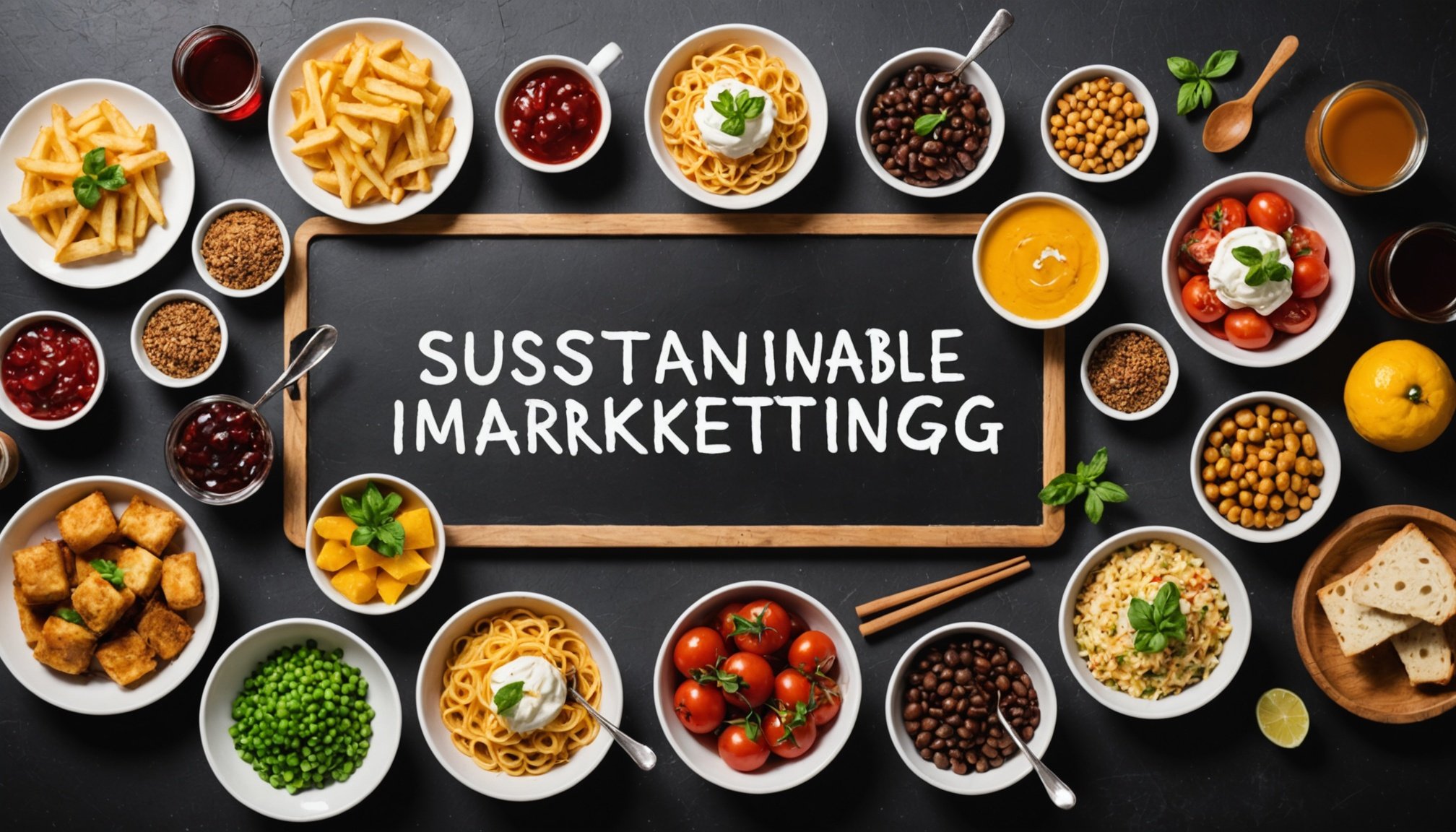Understanding the Importance of Sustainability in Digital Marketing
In today’s rapidly evolving market, sustainability in digital marketing has become paramount. Consumers are increasingly focusing on eco-friendly practices, demanding transparency and responsibility from brands. The relevance of this trend is evident in digital realms, where brands leverage sustainable marketing practices to engage conscientious consumers and enhance their reputations.
The food and beverage sector stands out as it embraces these eco-friendly strategies. By prioritizing sustainability, companies not only reduce their environmental footprint but also enhance their brand image, making them more appealing to modern consumers. Key benefits include fostering customer loyalty and differentiating from competitors. Sustainability in digital marketing thus becomes a strategic advantage rather than just an ethical choice.
Also read : Empowering uk non-profits: cutting-edge data analytics techniques to forge stronger donor relationships
Consumer trends underscore this shift, placing a premium on products that not only satisfy taste buds but also align with sustainable practices. This change reflects a broader societal shift towards conscious consumption, where people prefer brands committed to ethical sourcing and reduced waste. The impact is clear: businesses that align with this trend can expect a stronger connection with their audience, fostering a loyal customer base that values eco-conscious choices.
Identifying the Target Audience
The target audience is crucial in shaping effective marketing strategies for the food and beverage industry. By using techniques for researching UK food and beverage consumer demographics, brands can achieve a more precise understanding of their audience. Gathering consumer insights involves analyzing factors such as age, gender, location, and purchasing habits. Access to reliable data allows businesses to strategically align their offerings with the preferences and expectations of their target market.
Additional reading : Essential Factors to Consider When Crafting a Machine Learning Model for Predicting UK Stock Market Trends
To enhance consumer insights, it’s vital to grasp consumers’ growing preferences for sustainability. Individuals increasingly value environmentally friendly practices and products. Brands should thoroughly research consumer preferences and values related to sustainability. By focusing on these elements, they can authentically integrate sustainable practices into their marketing efforts, thereby fostering a positive brand image and garnering consumer trust.
Developing customer personas is another effective method to tailor marketing strategies towards the target audience. These personas are comprehensive profiles representing specific segments of the audience based on shared characteristics and behaviours. By using consumer insights to craft detailed customer personas, businesses can craft personalized marketing messages that resonate deeply with each segment, optimizing engagement and conversion rates.
Choosing Sustainable Marketing Channels
Finding the right sustainable marketing channels can be crucial for the food and beverage industry. Digital marketing platforms are excellent for reaching a broader audience while minimising environmental impact. By choosing eco-friendly options, brands can enhance their sustainable image.
Social media and email marketing are two digital marketing platforms with significant benefits. Social media allows for engaging with consumers in real-time, sharing educational content, and promoting eco-friendly practices. For example, a brand might showcase its sustainable packaging initiatives through Instagram stories or posts. Email marketing, on the other hand, provides a cost-effective way to reach consumers directly. Businesses can share updates about new sustainable products or initiatives, creating a consistent dialogue with their audience.
Partnering with sustainable brands and influencers further amplifies the message. Collaborations with like-minded influencers who are passionate about sustainability can drive higher engagement. These partnerships can introduce your brand to new audiences that value eco-friendliness, enhancing credibility.
When evaluating sustainable marketing channels, consider how each platform supports your environmental goals and aligns with your brand values. This approach not only boosts visibility but also strengthens consumer trust in your commitment to sustainability.
Crafting Effective Sustainability Messaging
Creating sustainable messaging involves crafting content that genuinely reflects a brand’s commitment to sustainability and resonates with an eco-conscious audience. This process begins with understanding the core principles of sustainability-driven content, which include transparency, relevance, and authenticity. A brand must showcase its genuine eco-friendly initiatives, avoiding greenwashing, to build trust with consumers.
Consider the UK food and beverage sector, where sustainable messaging has gained prominence. Brands like Oatly and Innocent Drinks have set benchmarks by integrating sustainability into their branding. Oatly, for instance, effectively communicates the environmental benefits of plant-based diets, supported by factual data and engaging content. Its branding isn’t merely about selling products; it’s about advocating for broader environmental change.
Moreover, aligning brand values with consumer expectations is crucial. Eco-conscious branding taps into the growing demand for sustainability, ensuring marketing messages resonate with consumers seeking environmentally responsible choices. This alignment not only enhances brand loyalty but also attracts new customers who prioritise ethical consumption.
By approaching sustainable messaging with integrity and creativity, brands can foster stronger connections with their audience, paving the way for long-term success and a positive environmental impact.
Implementing Tools for Digital Marketing Strategy
Digital marketing strategies are more effective when businesses adopt marketing tools for sustainability. These tools streamline processes, ensuring resources are used efficiently, leading to more eco-friendly marketing campaigns. Adopting digital marketing resources that prioritize sustainability not only aligns with environmental goals but also enhances brand reputation and customer loyalty.
For instance, a UK-based retailer adopted a cloud-based solution to reduce its carbon footprint. This change minimized paper use and optimized energy consumption by eliminating the need for physical mailing campaigns. As another example, an eco-conscious fashion brand used data analytics to pinpoint efficient supply chain operations, which significantly lessened its environmental impact.
Impact of Tools on Sustainability Strategy Execution
When organizations integrate these tools, they can see considerable improvements in their sustainability strategies. An impact assessment conducted on several enterprises highlighted:
- Improved tracking of carbon emissions to identify reduction opportunities
- Enhanced engagement with eco-aware consumer segments by personalizing content
- Cost savings achieved by cutting down on resource waste
These implementations underscore how utilizing specific marketing tools not only aids in achieving sustainability but also boosts overall efficiency and customer relations. Businesses can rely on these resources to ensure their marketing efforts contribute positively to both their bottom line and the environment.
Measuring the Impact of Sustainability in Marketing
Understanding how to quantify the impact of sustainability in marketing is crucial for businesses aiming to achieve environmental goals while also boosting brand perception. Companies often utilise various marketing performance metrics to gauge the success of their sustainability initiatives. Key metrics include carbon footprint reduction, waste minimisation, and energy savings. Not only do these metrics provide valuable insights into a company’s environmental progress, but they also resonate well with eco-conscious consumers.
To effectively track these metrics, companies employ an array of tools and techniques. Sustainability dashboards and environmental impact software are widely used for their ability to provide real-time data and comprehensive analyses. These tools can highlight areas of success and identify opportunities for improvement, allowing businesses to refine their strategies accordingly.
In the UK, the food and beverage sector offers compelling examples of sustainability measurement. Companies within this industry have adopted measures such as sustainable sourcing and reduced packaging. By measuring sustainability impact using these techniques, they have successfully communicated their commitment to environmental stewardship, which has become integral to their marketing strategies. This approach not only enhances their brand reputation but also encourages customer loyalty and engagement.
Case Studies from the UK Food and Beverage Sector
The UK food and beverage sector offers insightful case studies on sustainable marketing. Brands across the region stand out for their notable successes in this field, providing a wealth of lessons.
To begin with, numerous UK brands effectively integrate sustainable digital marketing into their strategy. A prime example includes companies emphasizing eco-conscious practices within their digital channels, from social media to online ads. By communicating their sustainable values clearly, these brands not only attract environmentally aware consumers but also strengthen loyalty among their clientele.
Key lessons learned from such successful UK brands revolve around transparency, authenticity, and value alignment. These companies often make it a point to be transparent about their sustainability measures, showcasing clear achievements and challenges. This openness fosters trust with the audience.
Practical takeaways are abundant from these case studies. For instance, brands prioritizing sustainable packaging found it advantageous to highlight these efforts in their marketing campaigns, thus differentiating themselves in a crowded marketplace. Future marketing efforts can draw inspiration from these strategies, ensuring sustainability is at the forefront of communication and engagement.











